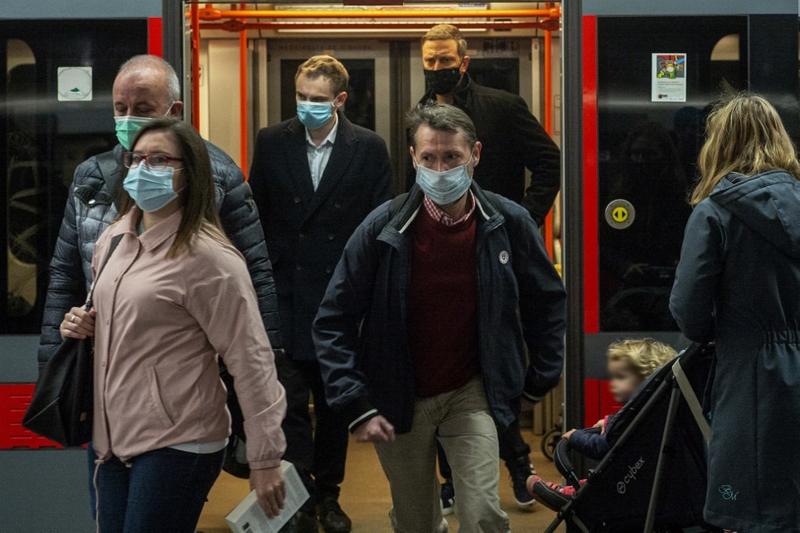 Passengers wearing face masks get off and on a train at a metro station on Oct 13, 2020 in Prague, Czech Republic. (MICHAL CIZEK / AFP)
Passengers wearing face masks get off and on a train at a metro station on Oct 13, 2020 in Prague, Czech Republic. (MICHAL CIZEK / AFP)
LIVERPOOL / LONDON / DUBLIN / RIO DE JANEIRO / MADRID / WARSAW / STOCKHOLM - The Czech Republic is closing schools as France, Italy, and the Netherlands prepare to widen restrictions to contain surging coronavirus cases around Europe.
UK Prime Minister Boris Johnson announced bars and pubs will be closed in the worst-hit parts of England from Wednesday, but his top health adviser said it won’t be enough.
The latest bout of harsher curbs comes as Germany’s new coronavirus cases increased at the fastest pace since the height of the pandemic in the latest sign of how the region is struggling to keep the disease in check. Europe’s largest economy will evaluate its own next steps on Wednesday.
Europe recorded 700,000 new cases last week, the most since the pandemic began, the World Health Organization said it its latest report. Even so, authorities have opted to avoid reviving national lockdown restrictions. The focus is instead on local measures amid concerns about hammering economies again and sparking unrest.
Fueling public resistance to harsher restrictions is the impression that the virus has lost its bite amid relatively low hospitalization and death rates. But authorities expect the number of severe cases to increase as more older people get infected.
The European Union loosened aid rules to help fight the economic fallout from crisis. The bloc also sought to provide some clarity to a confusing array of travel rules, with European affairs ministers signing off on a common threshold for imposing entry restrictions on Tuesday.
Under the non-binding plan, unfettered travel will be allowed between regions with fewer than 25 new cases per 100,000 people for the previous 14 days, and with fewer than 4 percent of tests showing positive results.
None of the EU’s 27 member states is currently below the agreed threshold, according to the latest data from the European Centre for Disease Prevention and Control.
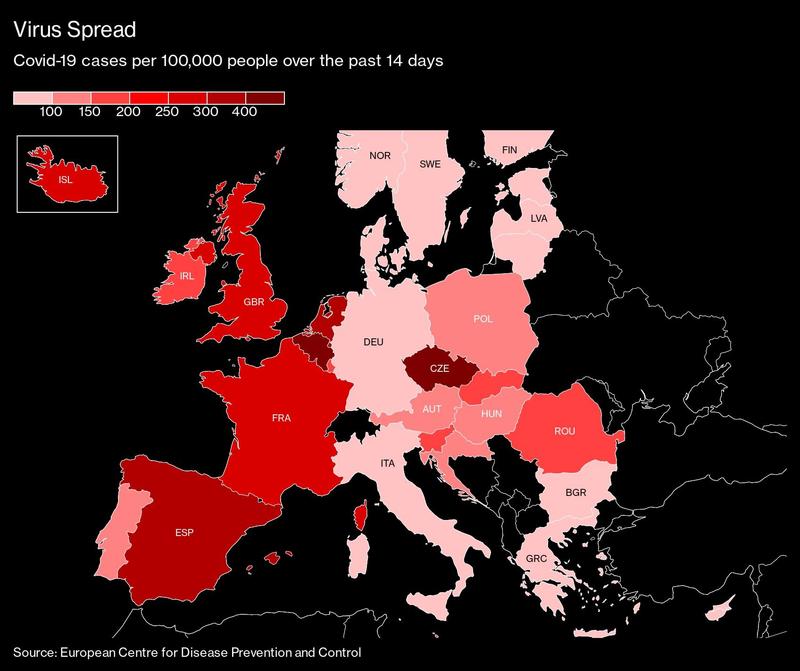
Germany
In Germany, new cases climbed by 6,541 in the 24 hours through Tuesday morning, according to data from Johns Hopkins University. That’s the highest daily increase since April 3 and only slightly below peak levels of nearly 7,000.
Chancellor Angela Merkel is preparing to meet with the premiers of Germany’s 16 states on Wednesday to decide on new measures such as testing in nursing homes and isolating travelers from high-risk areas. After meeting with big-city mayors on Friday, she warned that Germany faces a crucial moment that can determine whether it regains or loses control of the pandemic.
 Students of the eleventh grade sit with face masks in a classroom of the Phoenix high school in Dortmund, western Germany, on Aug 12, 2020. (PHOTO / AFP)
Students of the eleventh grade sit with face masks in a classroom of the Phoenix high school in Dortmund, western Germany, on Aug 12, 2020. (PHOTO / AFP)
EU
Europe’s hospitals have largely coped with the region’s re-emergence as a coronavirus hot spot, but pressure is expected to grow as cases surge.
Authorities are imploring pandemic-weary citizens to knuckle down on hygiene and distancing rules over concern that health-care resources are set to get stretched. There’s already been a steady uptick in hospitalizations that could quickly spike the way it did in the spring.
“As with tidal waves, it might seem like we have time, but actually, in the end, it’s a race,” Aurelien Rousseau, director of the regional health authority for Paris, said on France’s BFM TV on Monday. “We’re at that point where we’re entering a race against time.
With countries from Spain to Ukraine posting record increases in recent days, authorities are struggling to devise restrictions that slow the spread while not pushing the economy over the edge and sparking public unrest.
Lower death and hospitalization rates have stoked an impression that the disease has lost its bite, sparking resistance to tougher restrictions. But after the Covid’s European resurgence was fueled by younger people, the contagion is spreading to more vulnerable individuals.
“There is transmission between the generations, and that is our major worry,” Rousseau said, noting that positive test rates in the Paris region are at unprecedented levels and that hospital stays for severe cases are just as long as they were during the spring peak in deaths.
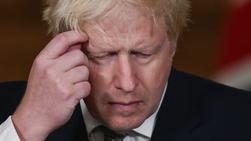 Britain's Prime Minister Boris Johnson gestures, during a coronavirus briefing in Downing Street, London, Monday, Oct. 12, 2020. (PHOTO / AP)
Britain's Prime Minister Boris Johnson gestures, during a coronavirus briefing in Downing Street, London, Monday, Oct. 12, 2020. (PHOTO / AP)
UK
The British government may have to impose stricter restrictions than it currently has if the second wave of the novel coronavirus accelerates in high risk areas, Housing Secretary Robert Jenrick said on Tuesday.
UK's Prime Minister Boris Johnson introduced a new tiered system of restrictions for England on Monday, with Liverpool and the surrounding Merseyside placed in the highest level, with pubs shut, to curb an acceleration in COVID-19 cases.
Boris Johnson imposed a tiered system of further restrictions on parts of England on Monday, including shutting pubs, to curb an acceleration in COVID-19 cases, though anger was rising at the cost of the curtailment of freedoms.
Johnson announced a new three-tiered system in an attempt to standardise a patchwork of often complicated and confusing restrictions imposed across England. Lawmakers will vote on the move on Tuesday.
The lockdowns will include shutting pubs and bars and banning wedding receptions in areas placed in the “very high” alert level from Wednesday. The other alert levels in the new system are “medium” and “high”.
So far, Merseyside in northwest England - which includes the city of Liverpool - is the only area classified at the “very high” level. Gyms, leisure centres, casinos, betting shops and adult gaming centres there will also close, Johnson said.
ALSO READ: WHO chief: Herd immunity is a concept used for vaccination
The Czech Republic
The Czech government tightened social distancing rules and closed down schools, restaurants and bars through early November. It also banned public alcohol consumption and limited outdoor gatherings to six people.
The country of 10.7 million is suffering the most acute epidemic among EU states. New infections reached a record of 8,618 cases on Friday, leapfrogging Spain as the bloc’s top hot spot based on the two-week cumulative number of cases per capita, according to the European Center for Disease Prevention and Control.
Poland
Polish Prime Minister Mateusz Morawiecki went into self-quarantine on Tuesday after contact with someone who tested positive for COVID-19, the illness caused by the novel coronavirus.
"Due to having contact with a person infected with COVID-19, I will go into quarantine according to all standard procedures," the PM wrote on social media, "I will keep in constant contact with my associates and all services."
According to Polish media, the person who tests positive was a member of the government security detail.
Government spokesperson Piotr Muller told broadcaster TVN that there is no testing information on Morawiecki as of Tuesday midday.
The country confirmed 5,068 COVID-19 cases during the last 24 hours.
Sweden
Sweden registered 2,203 new coronavirus cases in the last four days, Health Agency statistics showed on Tuesday, taking the total to 100,654 since the start of the pandemic.
Sweden has shunned lockdowns, leaving most schools, restaurants and businesses open throughout the pandemic.
Sweden registered 5 new deaths since Friday, taking the total to 5,899 deaths. Sweden’s death rate per capita is several times higher than Nordic neighbours but lower than countries like Spain, Italy and the UK that opted for lockdowns.
US
US President Donald Trump has tested negative for COVID-19 and he is not infectious to others, the White House physician said on Monday, 10 days after Trump announced he had contracted the coronavirus.
In a memo released by the White House just hours before Trump was due to resume holding campaign rallies, Dr. Sean Conley said the president had tested negative on consecutive days using an Abbott Laboratories BinaxNOW antigen card.
Conley said the negative tests and other clinical and laboratory data “indicate a lack of detectable viral replication.”
Trump’s medical team had determined that based on the data and guidelines from the US Centers for Disease Control and Prevention “the president is not infectious to others,” Conley said.
Trump returns to the campaign trail on Monday night with a rally in Sanford, Florida, his first since he disclosed on Oct 2 that he tested positive for COVID-19.
Critics fault Trump for failing to encourage supporters at campaign events, and even White House staff, to wear protective masks and abide by social-distancing guidelines. At least 11 close Trump aides have tested positive for the coronavirus.
The COVID-19 pandemic will exact a US$16 trillion toll on the US about four times the cost of the Great Recession, former US Treasury Secretary Lawrence Summers and fellow Harvard University economist David Cutler wrote in an essay published in the Journal of the American Medical Association.
COVID-19 cases in the United States totaled 7,802,281 with 214,045 deaths as of 7:24 p.m. local time (2324 GMT) on Monday, according to the Center for Systems Science and Engineering (CSSE) at Johns Hopkins University.
California has so far reported a total of 857,563 cases, the highest among all states. Texas registered 820,921, followed by Florida with 736,024. The caseload of New York state exceeded 470,000.
Ireland
Ireland’s government will offer in its budget for 2021 on Tuesday more support to those most impacted by some of Europe’s toughest COVID-19 restrictions and will also try to prepare for the added threat of a no trade deal Brexit.
Like other countries, Ireland has spent aggressively to contain the pandemic crisis with billions of euros in emergency jobless benefits, wage subsidies and business loan guarantees, turning last year’s budget surplus into a forecast deficit of 6.1 percent of gross domestic product (GDP) for 2020.
With the damage to the state finances not as bad as feared, ministers have a much bigger budget pot available. Sources familiar with the process say the spending plan is set to include a multi-billion euro Brexit and COVID-19 recovery fund and a VAT cut for the hard-hit hospitality sector.
The deficit is set to dip to just below 6 percent of GDP next year as a result of the new measures, one of the sources said.
Brazil
Brazil confirmed 201 coronavirus deaths over the last 24 hours and 8,429 new cases, the nation’s Health Ministry said on Monday.
The South American country has now registered 5,103,408 total confirmed coronavirus cases, from 5,094,979 on Sunday. Total deaths rose to 150,689 from 150,488 on Sunday.
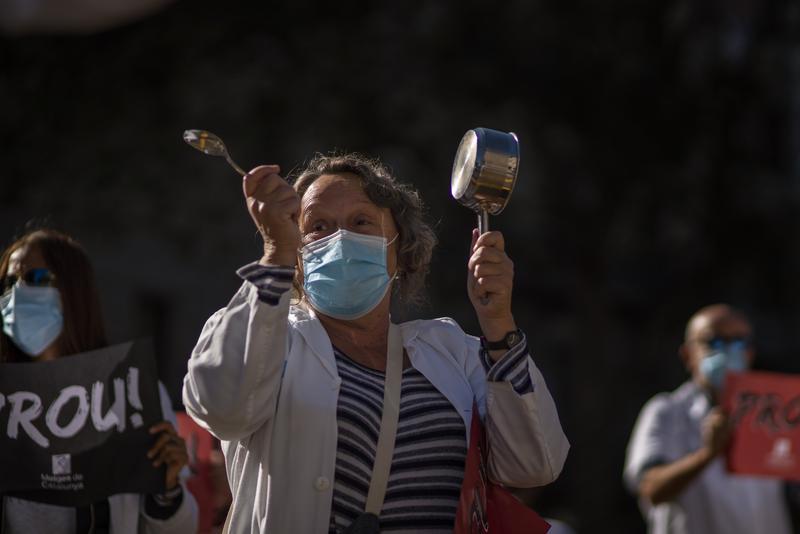 Primary care workers take part in a protest against their working conditions during a strike in Barcelona, Spain, Oct 13, 2020. (EMILIO MORENATTI / AP)
Primary care workers take part in a protest against their working conditions during a strike in Barcelona, Spain, Oct 13, 2020. (EMILIO MORENATTI / AP)
Spain
Spain has reported nearly 28,000 new coronavirus cases since Friday, bringing the cumulative total to 888,968, health ministry data showed on Monday.
The death toll from the virus rose by 195 from Friday to a total of 33,124. Spain does not report its coronavirus data during the weekend.
The number of new cases has stabilised since the peak on Sept. 18 when there were 16,000 cases in one day. The number of deaths reported on Friday was 241.
READ MORE: Bring your own pen: Lithuania votes amid pandemic
Johnson & Johnson
Johnson & Johnson said on Monday it had temporarily paused its COVID-19 vaccine candidate clinical trials due to an unexplained illness in a study participant, delaying one of the highest profile efforts to contain the global pandemic.
The participant's illness is being reviewed and evaluated by an independent data and safety monitoring board as well as the company's clinical and safety physicians, the company said here in a statement.
J&J, which reports quarterly financial results on Tuesday morning, said that such pauses are normal in big trials, which can include tens of thousands of people. It said the “study pause” in giving doses of the vaccine candidate was different from a “regulatory hold” required by health authorities. The current case is a pause.
However, J&J's move follows a similar one by AstraZeneca Plc. In September, AstraZeneca paused late-stage trials of its experimental coronavirus vaccine, developed with the University of Oxford, due to an unexplained illness in a UK study participant.
While trials in the UK, Brazil, South Africa and India have resumed, the US trial is still on hold pending a regulatory review.
Dr. William Schaffner, a professor of infectious diseases at the Vanderbilt University School of Medicine, said by email that “Everybody is on the alert because of what happened with AstraZeneca,” adding that it could take a week to gather information.
Kenya
Kenyan schoolchildren in grades four, eight and 12 returned to class on Monday, ending a months-long closure of all educational institutions in the country designed to slow the spread of the novel coronavirus.
Many nations have grappled with how to reopen schools safely amid the pandemic, but in Kenya, where public and private schools were shut after the first COVID-19 case was confirmed in March, the closures have been among the longest in Africa.
The three levels going back to school are all preparing for standardized exams that were postponed from November to March.
The government will decide later whether all students can return, Education Minister George Magoha said at a Nairobi primary school, where he accepted a donation of 1 million face masks from a Kenyan bank.
Cameroon
Cameroon national airline Camair-co announced on Monday it will soon resume flight operations on its domestic routes amid the COVID-19 pandemic.
Camair-co officials told reporters that the first flight will take off on Friday and domestic routes will for now cover cities of Douala, Yaounde and Garoua.
The airline suspended all flights in March following a raft of measures imposed by the government to help contain the spread of COVID-19.
Transport ministry officials said flight operations will be conducted in line with anti-coronavirus measures.
Chile
Chilean authorities are concerned about novel coronavirus (COVID-19) outbreaks in three southern regions of the country, Deputy Minister of Public Health Paula Daza said on Monday.
"We have to be extremely cautious" in managing the outbreaks in the regions of Magallanes, La Araucania and Los Rios, Daza told reporters at a press conference.
According to Chilean Minister of Health Enrique Paris, La Araucania, located some 700 kilometers south of the capital Santiago, "is registering very worrying figures, and the towns that are seeing a rise in cases are Temuco and Padre las Casas."
Chile is among several countries in Latin America with sizable outbreaks, along with Brazil, Mexico and Peru.
"Latin America is the worst hit area right now, since Latin America accounts for five of the countries that are among the 10 countries in the world with the highest number of cases. Therefore, we must not lower our guard," said Paris.
The Ministry of Health reported 1,517 new cases of COVID-19 in the past 24 hours, bringing the total caseload to 482,888, and 13,379 deaths from the disease.
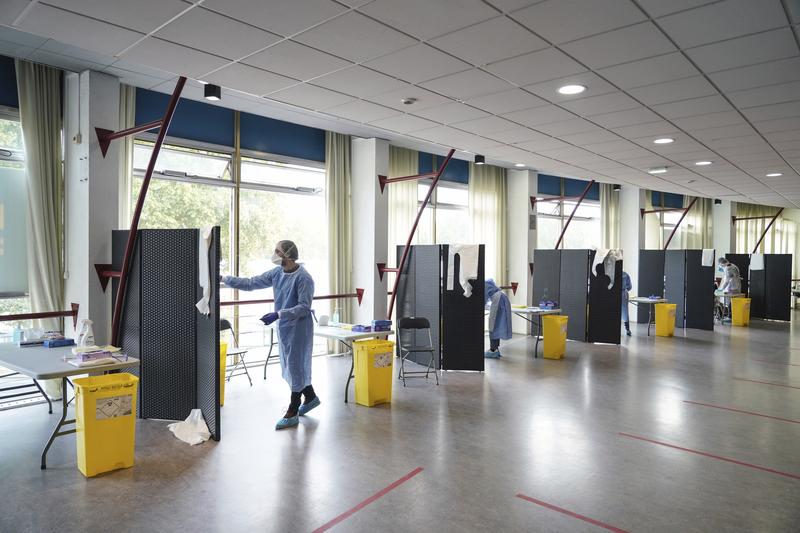 A medical worker prepares to collect nasal swab samples for COVID-19 in the Lyon sports arena, central France, Oct 13, 2020. (LAURENT CIPRIANI / AP)
A medical worker prepares to collect nasal swab samples for COVID-19 in the Lyon sports arena, central France, Oct 13, 2020. (LAURENT CIPRIANI / AP)
France
French Health authorities on Monday said 8,505 positive coronavirus cases were confirmed within 24 hours, sharply down from Sunday's 16,101, while coronavirus-related hospitalization data showed growing pressure on hospitals.
The numbers of news cases usually go lower on Mondays because tests are fewer or data is not fully collected on Sundays. On Saturday, France saw 26,896 new infection cases, setting a new all-time high.
As of Monday, the cumulative number of people who have caught the virus totals 743,479 in France since the epidemic outbreak, of whom 32,825 have died, representing a one-day increase of 96 versus 46 a day before.
The number of patients who are receiving treatment in hospital surged to 8,671, up from 8,252 on Sunday.
Algeria
Algeria on Monday reported 153 new COVID-19 cases, bringing the total tally of infections to 53,225, the Ministry of Health said.
The ministry also announced eight new fatalities from the novel coronavirus, raising the country's death toll to 1,809.
Meanwhile, 108 more patients were discharged from hospitals, bringing the total number of recoveries to 37,382.
Algeria, which reported its first COVID-19 case on Feb. 25, has been resuming economic and commercial activities since June 7.
Ethiopia
The Ethiopian Ministry of Health on Monday announced that the country's total number of confirmed COVID-19 cases hit 85,136, after 841 new cases were reported.
According to the ministry, the new cases were discovered out of 5,997 COVID-19 medical tests in the east African country conducted in the last 24 hours.
Ethiopia had conducted 1,356,630 COVID-19 medical tests, it was noted.
The ministry also disclosed that the number of COVID-19 related deaths in the country reached 1,301 as of Monday, after 14 new COVID-19 related deaths were reported during the last 24-hour period.
The ministry said that some 38,904 patients who tested positive for COVID-19 had recovered so far, including 588 in the last 24-hour period.
According to the ministry, a total of 44,929 COVID-19 patients are still undergoing medical treatment, including 230 in severe condition.
Morocco
Morocco announced on Monday 1,357 new COVID-19 infections, taking the tally in the North African country since March 2 to 153,761.
The number of recoveries from the coronavirus in Morocco increased to 129,498 after 2,091 more were added, while the death toll rose by 31 to 2,636, the ministry of health said in a statement.
Meanwhile, 464 patients are in intensive care units.
The COVID-19 fatality rate in Morocco stands at 1.7 percent and the current recovery rate is 84.2 percent.
Italy
There were 3,689 new active coronavirus infections in Italy on Monday and a total of 4,619 new cases including recoveries and fatalities, the Italian Ministry of Health reported.
A total of 891 patients recovered from the virus, bringing the total recoveries to 240,600, and 39 patients had died over the past 24 hours, pushing the total casualties to 36,205, the ministry announced.
The latest data brings to 359,569 the total number of infections, recoveries and fatalities since the COVID-19 pandemic first emerged in northern Italy in late February.
Russia
Russia registered 13,868 new coronavirus cases over the past 24 hours, bringing its total to 1,326,178, according to a statement published by the country's COVID-19 response center Tuesday.
Moscow reported most of the new cases with 4,618 infections, reaching a cumulative case count of 339,431, the center said.
Over the past day, 244 new deaths were reported, taking the country's death toll to 22,966, the center said, adding that 1,031,785 patients have recovered so far, including 7,550 over the past 24 hours.
The Russian government has introduced new restrictions in relation to the travel of the elderly, following autumn's surge in COVID-19 cases.
Russian President Vladimir Putin signed a degree on Monday, ordering the creation of a security council commission to develop a system to guard against new infections.
Georgia
Georgia reported 569 new COVID-19 cases on Tuesday, bringing its total to 12,841.
A total of 168 of the 569 new cases were confirmed in the capital city of Tbilisi, the National Center for Disease Control and Public Health said.
As of Tuesday, 6,867 of the 12,841 COVID-19 patients have recovered, while 102 others have died, said the center.


